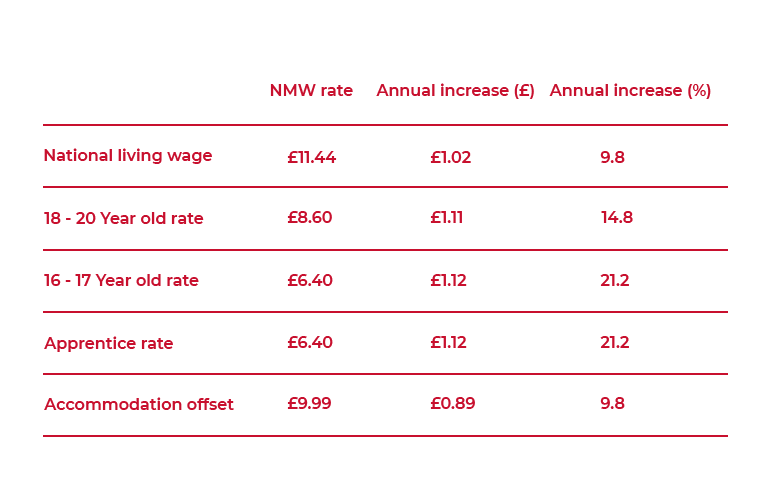Changes for the New Tax Year 2024/25

As we approach the new tax year these are some of the key changes to expect in the world of payroll and HR.
National Living Wage and National Minimum Wage
The National Living and Minimum Wage rates have seen another large increase for the coming tax year. While inflation rates have fallen they still remain high and the government has again accepted the proposals from the Low Pay Commission.
Perhaps the biggest change however is that from the 2024/25 tax year the National Living Wage will apply to those aged 21 and over when currently it is those aged 23 and over. With the biggest increases being seen for younger workers we are beginning to see a move towards parity of the wage rates.
The new rates, which apply to pay reference periods beginning on or after 1st April 2024, can be seen below:

Income Tax
The situation for income tax remains unchanged for most of the UK, with the England and Northern Ireland rates and tax thresholds remaining unchanged and Wales again deciding to keep their rates aligned.
Changes are coming for Scottish residents however, with a new Advanced tax rate being introduced at 45%, falling between the existing Higher and Top rates, the latter of which has also been increased by 1% to 48%.
The personal allowance applies to the whole of the UK and remains frozen at £12,570. This and the majority of the tax thresholds being frozen will continue to mean fiscal drag will increase the tax people pay after an extended period of high wage growth due to inflation.
National Insurance
A further 2% reduction in the main employee rate of National Insurance will take effect from 6th April 2024. After reduction from 6th January this brings the employee rate to 8%. All the thresholds remain frozen. There will also be four new NI categories relating to Investment Zones. These are N, E, K and D. Investment Zones are functionally equivalent to Freeports for National Insurance purposes.
Statutory Payments
As with minimum wage, rates of inflation mean another year of large increases to statutory payments. The standard rate for parental payments (SMP, SPP, SAP, etc.) has increased to £184.03 from 7th April 2024 and SSP has increased to £116.75 per week from 6th April 2024.
As well as increases to the rates of pay, April 2024 also brings changes to Statutory Paternity Pay and Leave. The period of time available to take paternity leave will increase from the current 8 weeks to 52 weeks from the date of birth or placement. The second week of leave can also be taken separately rather than in a single block of two weeks as per the current rules. These changes apply to expected birth dates from 7th April and for expected placement dates from 6th April in the case of adoptions.
Student Loans
All rates for student loans remain the same in the coming tax year, but the threshold for Plan Type 1 has increased to £24,990 and Plan Type 4 to £31,395.
2023 also saw the introduction of the new Plan Type 5 for students commencing studies from August 2023. It is not expected that repayment of these loans will commence before the 2026/27 tax year.
New HR Legislation
2023 saw many pieces of legislation receiving Royal Assent which are due to come into effect in 2024. Following are the ones that are likely to have the biggest impact for payroll and HR.
Holiday pay and entitlement
The holiday pay saga continues in 2024 with new legislation taking effect from 1st January 2024. We will see the return of rolled-up holiday pay and the 12.07% accrual rate which had previously been deemed illegal in such high-profile cases as Harpur Trust v Brazel.
The legislation retains the split of 4 weeks at normal rate of pay and 1.6 weeks at basic rate of pay but does at least attempt to define what constitutes “normal” pay.
For many workers the new legislation will make no difference to the way holiday pay is calculated and the current rules and complexities of average holiday pay remain. But for some, new options are available leave years beginning on or after 1st April 2024:
- rolled-up holiday pay
- holiday entitlement based on an accrual rate of 12.07% of hours worked
Both these measures will apply to irregular hours and part-year workers only, both of which are defined in the legislation.
Flexible working requests
The Flexible Working Regulations will formally make requesting flexible working arrangements a day one employment right from 6th April 2024. This is currently a right only available to those in a job for 6 months or more.
Tips
The Employment (Allocation of Tips) Act 2023 was given Royal Assent in May. The act aims to ensure that tips, gratuities and service charges paid by customers are allocated in full to workers.
This Act applies to England, Wales and Scotland and becomes law on 1st July 2024.
Protection from redundancy
From 6th April 2024 the protections from redundancy afforded to those on maternity, adoption or shared parental leave will be extended. The rights will now apply to pregnant employees from the point they inform their employer and will extend up to 18 months after childbirth.
Carer's Leave
Also from 6th April 2024, the Carer’s Leave Act makes provisions for up to a week of unpaid leave for employees with caring responsibilities for a dependent with a long-term care need (e.g., elderly or disabled).
This will be:
- Day one right.
- Taken in increments of half- or full days, up to a week, over a 12-month period.
- No evidence requirements.
- Same employment protections as for other types of family related leave.
- Intended for planned and foreseen commitments as opposed to the emergency situations that Dependents Leave would apply to.
- Not intended for childcare situations except where the child meets the definitions of a dependent with a long-term care need.
Looking ahead to 2025 and beyond
There are more changes due to come into force in 2025 and beyond. Some of these measures are still undergoing consultations so the details may change as.
Improving the data HMRC collects from its customers
The government has published draft legislation that will require additional information to be sent to HMRC. Employers will need to provide information on employee hours worked via Real Time Information PAYE reporting. These measures are undergoing consultation and it is appearing likely that the scope of the required information will be larger than initially indicated.
The measure will take effect no earlier than the start of the tax year 2025 to 2026.
Mandating payrolling of benefits
As part of a raft of measures announced with the aim of simplifying the tax system, it has been confirmed that the government will be mandating the reporting of tax and Class 1A NICs on BIKs through payroll. This is commonly referred to as payrolling. This is undergoing consultation so it is too soon to know how precisely this will work in practice and it can’t be assumed that it will work in the same way as the current voluntary payrolling rules. The government may want to simplify but HMRC want more and more data.
Pensions Auto Enrolment
The Pensions (Extension of Automatic Enrolment) (No. 2) Bill is set to abolish the Lower Earnings Limit for pension contributions and reduce the age for being auto enrolled to 18. The government have confirmed that they do not believe now is the right time to implement these changes and it is likely there will be a consultation before any changes take effect.
Neonatal Care
The Neonatal Care (Leave and Pay) Act 2023 received Royal Assent in May 2023. The act will give a statutory right to leave and pay, if eligible, for parents of babies requiring neonatal care. This would introduce a new statutory payment type to be reported on RTI submissions.
No firm date for commencement of this legislation has been provided so it seems likely at this stage that it will come into force from April 2025.

